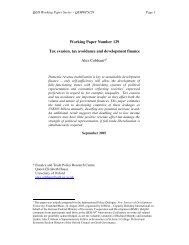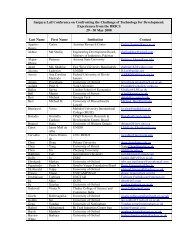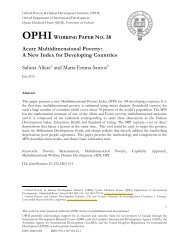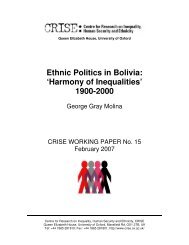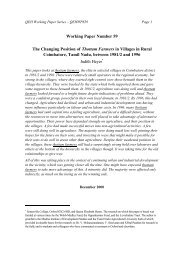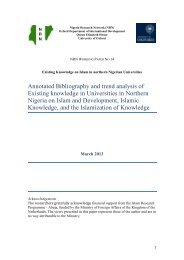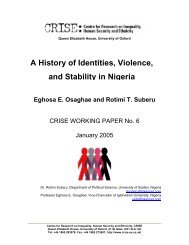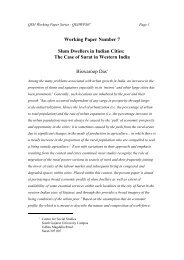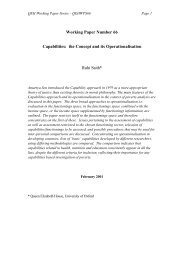Muslims of Nasarawa State: A Survey - QEH Working Papers ...
Muslims of Nasarawa State: A Survey - QEH Working Papers ...
Muslims of Nasarawa State: A Survey - QEH Working Papers ...
You also want an ePaper? Increase the reach of your titles
YUMPU automatically turns print PDFs into web optimized ePapers that Google loves.
Nigeria Research Network (NRN)<br />
Oxford Department <strong>of</strong> International Development<br />
Queen Elizabeth House<br />
University <strong>of</strong> Oxford<br />
NRN BACKGROUND PAPER NO. 7<br />
<strong>Muslims</strong> <strong>of</strong> <strong>Nasarawa</strong> <strong>State</strong>: A <strong>Survey</strong><br />
Sa’adatu Hassan Liman and Abubakar S.I. Wakawa *<br />
January 2012<br />
Acknowledgements<br />
The author gratefully acknowledges financial support from the Islam Research Programme - Abuja,<br />
funded by the Ministry <strong>of</strong> Foreign Affairs <strong>of</strong> the Kingdom <strong>of</strong> the Netherlands. The views presented in<br />
this paper represent those <strong>of</strong> the author and are in no way attributable to the Ministry.<br />
* Dr. Mrs. Sa'adatu Hassan Liman obtained her Ph.D. in Philosophy at the University <strong>of</strong> Jos in 2010, with a<br />
dissertation on Cultural influence on the Rights <strong>of</strong> W omen in the Application <strong>of</strong> Shari‘ah in <strong>Nasarawa</strong> and<br />
Plateau <strong>State</strong>s, Northern Nigeria. She is a lecturer in the Department <strong>of</strong> Religious Studies, <strong>Nasarawa</strong> <strong>State</strong><br />
University, Keffi. Dr. Abubakar Sadiq Idris Wakawa obtained his Ph.D. in Arabic at <strong>Nasarawa</strong> <strong>State</strong> University,<br />
Keffi, in 2010 with a dissertation on The Requisitive Moods as a Style <strong>of</strong> Expression in the Prophetic Traditions<br />
in Al-Muwatta by Imam Malik; he is a lecturer in the Department <strong>of</strong> Languages and Linguistics at the same<br />
university.
Abstract<br />
NRN Background Paper No. 7<br />
This paper first gives an introduction to <strong>Nasarawa</strong> <strong>State</strong>, giving information about its<br />
population, the ethnicities <strong>of</strong> its peoples and their occupations, and estimated percentages <strong>of</strong><br />
<strong>Muslims</strong> and Christians. The paper then moves to more detailed discussions <strong>of</strong> sects among<br />
the <strong>Muslims</strong>, the various ways <strong>Muslims</strong> are educated, and their participation in and attitudes<br />
towards politics and government. It concludes with surveys <strong>of</strong> Muslim NGOs and prominent<br />
scholars and other individuals, with specific details on three Muslim NGOs and three<br />
individual <strong>Muslims</strong> active in the state.<br />
Table <strong>of</strong> Contents<br />
1. Introduction to <strong>Nasarawa</strong> <strong>State</strong> 3<br />
a. Ethnicity 3<br />
b. Religion 3<br />
c. Occupations 4<br />
2. Categories <strong>of</strong> <strong>Muslims</strong> 4<br />
a. Overview 4<br />
b. Sunni groups 5<br />
c. Inter-group relations 5<br />
3. Education 5<br />
a. Qur’anic schools 5<br />
b. Islamiyya schools 5<br />
c. Public schools 6<br />
4. Politics and government 6<br />
a. Traditional rulerships 6<br />
b. Muslim attitudes towards the Nigerian constitution; participation in politics 7<br />
c. Islam in government 7<br />
5. Muslim NGOs 7<br />
a. Overview 7<br />
b. Details on three groups 8<br />
i. Voice <strong>of</strong> Islam 8<br />
ii. Jama’atu Izalatil Bid’a Wa’ikamatis Sunnah (Izala, or JIBWIS) 8<br />
iii. Darikatul Tijaniyya 9<br />
6. Notable individuals 9<br />
a. The Emirs 9<br />
b. List <strong>of</strong> some other influential <strong>Muslims</strong> and Muslim scholars 9<br />
c. Details on three individuals 10<br />
i. Ustaz Muhammad Auwal Ali, Special Assistant to the Governor on<br />
Islamic Affairs<br />
10<br />
ii. Hajiya Zainab Talatu Abdulmu’min, <strong>State</strong> Amirah, FOMWAN and<br />
Permanent Secretary, <strong>Nasarawa</strong> <strong>State</strong> Civil Service<br />
11<br />
iii. Ustaz Suraj Alhaji Sabo, <strong>State</strong> Vice Chairman I, JIBWIS 11<br />
2
1. Introduction to <strong>Nasarawa</strong> <strong>State</strong><br />
NRN Background Paper No. 7<br />
<strong>Nasarawa</strong> <strong>State</strong> was formerly part <strong>of</strong> Benue-Plateau <strong>State</strong> (1967-76), then part <strong>of</strong> Plateau<br />
<strong>State</strong> (1976-96) until it was carved out as a separate state by the military regime <strong>of</strong> General<br />
Sani Abacha. Its capital is Lafia. It is divided into 13 Local Government Areas (LGAs). Its<br />
population in 2006, according to the national census taken that year, was reported to be<br />
1,863,275, making it the smallest state in the North Central Zone.<br />
This paper is based on interviews and existing literature. We chose to interview people<br />
based on their importance either in the governance <strong>of</strong> the state, in the prominent Islamic<br />
organizations or in the society. As it can be observed (see page 12), among those interviewed<br />
we have the special assistant to the governor on religious affairs, who is also the Chief Imam<br />
<strong>of</strong> the second largest mosque in Lafia (the <strong>State</strong> capital). We also have a permanent secretary<br />
in the <strong>of</strong>fice <strong>of</strong> the head <strong>of</strong> civil service in the state. She is also the Amirah (leader) <strong>of</strong><br />
FOMWAN, the largest Muslim women organization in Nigeria <strong>Nasarawa</strong> <strong>State</strong> branch.<br />
Others interviewed include leaders <strong>of</strong> different Muslim organizations in different local<br />
government areas in the <strong>State</strong> and leaders <strong>of</strong> some youth organizations. We also wrote all the<br />
Muslim organizations and finally narrowing down on the few ones with larger followership.<br />
a. Ethnicity<br />
Ethnically, <strong>Nasarawa</strong> <strong>State</strong> is extremely diverse. The tribes found here include state<br />
include Hausa, Kanuri, Fulani, Alago, Koro, Mada, Eggon, Rindre, Gwandara, Gade, Gbagyi,<br />
Mama, Toni, Yaskuwa, Bassa, Kwatto, Afo, Kwara, and many more. These trusted groups<br />
and some others that were not mentioned, all have become proper indigenes <strong>of</strong> <strong>Nasarawa</strong><br />
<strong>State</strong>, and none <strong>of</strong> these groups are considered as settler ethnic groups in the state. The only<br />
settlers are Yoruba and Igbo people which are found in almost every town but most <strong>of</strong> them<br />
do not claim indigeneship.<br />
b. Religion<br />
It is difficult to estimate the percentages <strong>of</strong> <strong>Muslims</strong>, Christians and practitioners <strong>of</strong><br />
African Traditional Religions among the people. The 1963 Nigerian census put the<br />
percentage <strong>of</strong> <strong>Muslims</strong> in what is now <strong>Nasarawa</strong> <strong>State</strong> at about 30% <strong>of</strong> the population, while<br />
about 14% were Christian and a majority <strong>of</strong> 56% adherents <strong>of</strong> “other” religions. 1 The<br />
percentage <strong>of</strong> “others” has no doubt been significantly reduced by now, with most people<br />
being either <strong>Muslims</strong> or Christians at least nominally. But how many belong to which group<br />
is not known with any precision. For purposes <strong>of</strong> this research, we made two kinds <strong>of</strong><br />
investigation into this question. One was to determine the number <strong>of</strong> <strong>Muslims</strong> among certain<br />
categories <strong>of</strong> elected <strong>of</strong>ficials. The result <strong>of</strong> this was as follows:<br />
Table 1: <strong>Muslims</strong> among current elected <strong>of</strong>ficials <strong>of</strong> <strong>Nasarawa</strong> <strong>State</strong> 2<br />
Gov.<br />
Dep.<br />
Gov.<br />
<strong>Muslims</strong> in<br />
House <strong>of</strong><br />
Assembly<br />
L.G.<br />
Chmships<br />
Total<br />
Muslim<br />
<strong>of</strong>ficials<br />
%<br />
Muslim<br />
<strong>of</strong>ficials<br />
Senate<br />
House <strong>of</strong><br />
Reps<br />
Mslm Chstn 16/24 8/13 1/3 5/6 31/48 65<br />
1 Based on calculations from the 1963 census results performed by Philip Ostien, see Appendix to his “Report<br />
on Nigeria’s North Central Geo-Political Zone” for this project.<br />
2 As at early March 2011, before the elections <strong>of</strong> April 2011. In the case <strong>of</strong> the Local Government<br />
Chairmanships, the data are for late 2010, before the Local Government Councils were dissolved in anticipation<br />
<strong>of</strong> new elections.<br />
3
NRN Background Paper No. 7<br />
Even where they have a choice between a Muslim and a Christian candidate, <strong>of</strong> course,<br />
people do not always vote for their own co-religionist. But they <strong>of</strong>ten do; furthermore the<br />
religion <strong>of</strong> the candidates will <strong>of</strong>ten reflect the religion <strong>of</strong> the majority <strong>of</strong> people in the<br />
constituency. So these numbers give some indication <strong>of</strong> the relative numbers <strong>of</strong> <strong>Muslims</strong> and<br />
Christians among the population. Then the other investigation we made, was to make<br />
inquiries among knowledgeable residents <strong>of</strong> each <strong>of</strong> the LGAs, as to their best estimates <strong>of</strong><br />
the percentages <strong>of</strong> <strong>Muslims</strong> living there. The results are as follows (with LGAs listed in<br />
descending order by 2006 population):<br />
Table 2: Estimated percentages <strong>of</strong> <strong>Muslims</strong> per <strong>Nasarawa</strong> <strong>State</strong> LGA<br />
LGA 2006 population Est. % Muslim<br />
Lafia 330,712 70<br />
Karu 205,477 50<br />
<strong>Nasarawa</strong> 189,835 80<br />
<strong>Nasarawa</strong> Eggon 149,129 30<br />
Obi 148,874 55<br />
Doma 139,607 70<br />
Toto 119,077 60<br />
Akwanga 113,430 30<br />
Awe 112,574 90<br />
Kokona 109,749 50<br />
Keffi 92,664 70<br />
Keana 79,253 80<br />
Wamba 72,894 60<br />
Total <strong>Nasarawa</strong> <strong>State</strong> 1,863,275 61<br />
The result <strong>of</strong> about 61% Muslim for the whole <strong>of</strong> <strong>Nasarawa</strong> <strong>State</strong>, calculated from the LGA<br />
estimates and 2006 population figures, is not far <strong>of</strong>f from the percentage <strong>of</strong> <strong>Muslims</strong> among<br />
current elected <strong>of</strong>ficials.<br />
c. Occupations<br />
The traditional occupations <strong>of</strong> the people <strong>of</strong> <strong>Nasarawa</strong> state as everywhere in Nigeria is<br />
hunting, farming, wrestling, blacksmith, pottery among others. While a lot <strong>of</strong> the people<br />
became educated and thus we have civil servants, private pr<strong>of</strong>essionals, politicians,<br />
businessmen etc. The most important thing to note is the fact that, in every town, village, and<br />
among all the ethnic and religious groups, we have these social stratifications. So also the<br />
people’s affiliation to one or more religious group and organization and or sects cut across<br />
each and every ethnic and social group. It is difficult to attach any religious sect and or<br />
organization to e.g. civil service, farmers, business men etc.<br />
2. Categories <strong>of</strong> <strong>Muslims</strong><br />
a. Overview<br />
There are different Muslim groups in <strong>Nasarawa</strong> state. These include Sunnis, Ahmadis,<br />
some “Shia” (followers <strong>of</strong> Sheikh Ibraheem El Zakzaky <strong>of</strong> Zaria). Among these categories,<br />
Sunnis are in the vast majority: Ahmadiyya, “Shia” and Qur’aniyyun are just small minority<br />
sects in <strong>Nasarawa</strong> <strong>State</strong>. They do not command followership like the Sunnis. Unlike all the<br />
other groups, the Qur’aniyyun do not accept Sunnah or Hadith <strong>of</strong> the Prophet such as the<br />
collections in al-Bukhari, Muslim, Muwatta etc. They are not large in number and are found<br />
in Lafia. Some <strong>of</strong> them are educated, civil servants and most <strong>of</strong> them are youth.<br />
4
. Sunni groups<br />
NRN Background Paper No. 7<br />
Among the Sunnis, there are further categories. Both <strong>of</strong> Nigeria’s two main Sufi groups,<br />
the Qadiriyya and the Tijaniyya, are represented. It is very difficult to make any analysis or<br />
breakdown by ethnicity, occupation and or location. But the Qadiriyya are very small in<br />
number compared to the Tijaniyya. Probably among all the <strong>Muslims</strong> in <strong>Nasarawa</strong> <strong>State</strong>, the<br />
Tijaniyya are in the majority. There are also anti-Sufis: these are mainly the Izala. They are<br />
also large in population and they cut across ethnicity, rural and urban areas. A lot <strong>of</strong> them are<br />
educated and are civil servants. The Tijaniyya and Izala are discussed in more detail in<br />
section 5.b below.<br />
But the distribution <strong>of</strong> all these groups ranges across the educated and non-educated, they<br />
are found in all ethnic groups and both in the villages and cities. It is very difficult to<br />
distinguish them by language or social placement. Almost all <strong>of</strong> these sects do not know the<br />
number <strong>of</strong> their as these followers are spread around in all the villages, towns and cities.<br />
None <strong>of</strong> these groups have a society or community <strong>of</strong> its own. None is isolated from the<br />
rest <strong>of</strong> the population <strong>of</strong> both Christians and <strong>Muslims</strong> in the state. However there is a group<br />
lead by Baban Salma that migrated from Keffi and has its settlement called Madinat al-<br />
Munawwara. They are followers <strong>of</strong> Tijaniyya order. They also have some members scattered<br />
in Mararraba and other few places. Some <strong>of</strong> them are educated and working class too. Their<br />
population is not much.<br />
c. Inter-group relations<br />
There is a peaceful coexistence between all the groups with each minding its activities.<br />
No clashes are recorded so far.<br />
3. Education<br />
a. Qur’anic schools<br />
In almost all the towns <strong>of</strong> <strong>Nasarawa</strong> <strong>State</strong>, the traditional almajiri system <strong>of</strong> education is<br />
found among the <strong>Muslims</strong>. It is difficult to get numerical data. However examples can be<br />
cited from two almajiri schools in Keffi town, the school <strong>of</strong> the Chief Imam <strong>of</strong> Keffi and that<br />
<strong>of</strong> late Imam Malam Ali. These reveal that in these two schools taken together, 1000 got to<br />
the level <strong>of</strong> titibiri (adolescents), 225 got to gardi level (having completed memorization <strong>of</strong><br />
the entire Qur’an), while 3215 students got to the level <strong>of</strong> alaramma (able to write the entire<br />
text <strong>of</strong> the Qur’an). The students in these categories, across the state, cut across ethnic<br />
groups. But most <strong>of</strong> them are children coming in from the villages to towns in search <strong>of</strong><br />
Islamic education and some are not even from <strong>Nasarawa</strong> <strong>State</strong> but from far and wide.<br />
Examples <strong>of</strong> such coming from far and wide can be seen in Doma in a place called Tudun<br />
Wadan Alaramma, where both the teachers and the students are from Hausa lands.<br />
b. Islamiyya schools<br />
Islamiyya schools are <strong>of</strong> different categories. There is the one for adult literacy and that<br />
for pupils and children. The ones for the children are many and spread all over the state.<br />
There is hardly a town without an Islamiyya school. In this case, both the staff and the<br />
students are <strong>of</strong> these towns, i.e. they are indigenous. For example in Keffi there are more than<br />
20 Islamic owned schools out <strong>of</strong> which more than 10 are awarding both primary and<br />
secondary school certificates. There are two more schools running diploma programmes, one<br />
aligned with the Institute <strong>of</strong> Education at ABU Zaria and the other with BUK Kano. All are<br />
private owned schools. While in Doma there are about 5 Islamic primary schools, out <strong>of</strong><br />
which only one is government-owned. There are two private secondary schools and no higher<br />
institution.<br />
5
NRN Background Paper No. 7<br />
There are not any government Islamic schools in Keffi either primary or secondary or<br />
tertiary. Here are the names <strong>of</strong> some Islamic schools in Lafia:<br />
i. Al- Iman School, Shendam Road<br />
ii. JIBWIS Secondary School, Abuja Street<br />
iii. Dunama College <strong>of</strong> Islamic Studies, Ambuna Road<br />
iv. Madarasatu Ta’aleemul Sibyan, Makurdi Road<br />
v. Fajrussadiq Islamic School, Shendam Road<br />
vi. Sambo Tarbiyyatul Islam, Wadata<br />
vii. Hayatul Iman Sarki Baba, Super Cinema Street<br />
viii. Ansaruddeen School, Millionaires’ Quarters<br />
ix. Markazul Islam Islamic Centre, Makurdi Road<br />
x. Madinatul Ahbab, B.A.D Road<br />
In <strong>Nasarawa</strong> <strong>State</strong> there is no College <strong>of</strong> Islamic Legal Studies, whether privately or<br />
publicly owned, but there are some private diploma-awarding schools like Al-Iman Lafia and<br />
also two in Keffi. They are all affiliated to the Institute <strong>of</strong> Education, ABU Zaria.<br />
c. Public schools<br />
Generally <strong>Muslims</strong> patronize the government-owned institutions at all levels, primary<br />
through tertiary and up to Ph.D. level, and the percentage <strong>of</strong> patronage is very high. Islamic<br />
Religious Knowledge is mandatory for Muslim students through Junior Secondary School 3,<br />
and optional after that, but most Muslim students pursue it through Senior Secondary 3, the<br />
final year <strong>of</strong> secondary school. Then in the tertiary institutions one can pursue Islamic studies<br />
further. For example, at <strong>Nasarawa</strong> <strong>State</strong> University Keffi there is a Department <strong>of</strong> Languages<br />
and Linguistics in which one can pursue the study <strong>of</strong> Arabic, and a Department <strong>of</strong> Religious<br />
Studies in which one can pursue Islamic Studies, in both cases up to Ph.D. level. There is no<br />
separate degree in “Civil and Islamic Law” or “Common and Islamic Law” in the Faculty <strong>of</strong><br />
Law, but there is a Department <strong>of</strong> Islamic and Customary Law, and one can pursue<br />
concentrations in these areas at all levels <strong>of</strong> study. As indicated, many Muslim students are<br />
pursuing Arabic and Islamic studies at the tertiary level in <strong>Nasarawa</strong> <strong>State</strong>.<br />
4. Politics and government<br />
a. Traditional rulerships<br />
There are many chiefdoms in the state with their rulers having either first class, second<br />
class or third class staff <strong>of</strong> <strong>of</strong>fice. Each <strong>of</strong> the 13 LGAs has its own paramount chief, as<br />
follows (in order <strong>of</strong> seniority within the state):<br />
Table 3: Head chiefdoms by LGA<br />
LGA Paramount chief<br />
Lafia Emir <strong>of</strong> Lafia<br />
Keffi Emir <strong>of</strong> Keffi<br />
<strong>Nasarawa</strong> Emir <strong>of</strong> <strong>Nasarawa</strong><br />
<strong>Nasarawa</strong> Eggon Aren Eggon<br />
Doma Andoma <strong>of</strong> Doma<br />
Keana Osana <strong>of</strong> Keana<br />
Awe Sangari Awe<br />
Akwanga Chun Mada<br />
Wamba Oriye Rindre<br />
Toto Ohimege Opanda<br />
Karu Esu Karu<br />
6
Kokona Abaga Toni<br />
Obi Osukwo Obi<br />
NRN Background Paper No. 7<br />
The Emir <strong>of</strong> Lafia, who traces his lineage to the Kanem Borno Empire, is the Chairman <strong>of</strong> the<br />
<strong>Nasarawa</strong> <strong>State</strong> Council <strong>of</strong> Chiefs. But in addition to the chiefs listed, there are traditional<br />
rulers in all the towns and villages, too numerous to mention. Among the chiefdoms listed in<br />
Table 3, some are specifically Muslim (the emirates), while others are arise rather from ethnic<br />
traditions. Some <strong>of</strong> the occupants <strong>of</strong> the latter chiefdoms are <strong>Muslims</strong> and some Christians,<br />
and this is true also <strong>of</strong> all the lesser traditional <strong>of</strong>fices throughout the state.<br />
b. Muslim attitudes towards the Nigerian constitution; participation in<br />
politics<br />
Generally the <strong>Muslims</strong> in <strong>Nasarawa</strong> <strong>State</strong> have no problem with the Nigerian constitution.<br />
They are identified with it and have become part and parcel <strong>of</strong> it. The <strong>Muslims</strong> are major<br />
stakeholders in politics. As shown in Table 1 in section 1.b above, they participate in<br />
elections and are elected into <strong>of</strong>fices.<br />
The major parties in <strong>Nasarawa</strong> state are the PDP and CPC. The <strong>Muslims</strong> have<br />
championed the course <strong>of</strong> PDP right from its inception. With the coming out <strong>of</strong> CPC, they are<br />
not left behind. Party affiliation in the state is not by ethnicity or sectarianism those two<br />
variables do not effect politics. The governor is a Muslim (Aliyu Akwe Doma) from PDP.<br />
For now his only strong opponent, Alh .Tanko Umar Almakura, is also a Muslim from CPC.<br />
c. Islam in government<br />
In <strong>Nasarawa</strong> <strong>State</strong> the government pursues the causes <strong>of</strong> both Islam and Christianity. For<br />
example, the Governor has two advisers on religious matters, one Muslim and one Christian.<br />
There is a Muslim Pilgrims Welfare Board and a Christian Pilgrims Welfare Board. There is<br />
a Sharia Court <strong>of</strong> Appeal and a Customary Court <strong>of</strong> Appeal, the one to hear appeals from the<br />
Area Courts in matters decided under Islamic personal law, the other to hear appeals in cases<br />
decided under one or another body <strong>of</strong> customary law practiced in the state. But many <strong>of</strong> the<br />
<strong>Muslims</strong> in the state are yearning for sharia implementation as has been done in twelve states<br />
farther to the north, though the state has not instituted it.<br />
5. Muslim NGOs<br />
a. Overview<br />
There are many Muslim organizations in the state. To name a few (in alphabetical order):<br />
Alsalafiyya<br />
Ansaruddeen Society <strong>of</strong> Nigeria<br />
Darikatul Tijaniyya<br />
Federation <strong>of</strong> Muslim Women Associations in Nigeria (FOMWAN)<br />
Fityanul Islam<br />
Jama’atu Da’wah<br />
Jama’atu Izalatil Bid’a Wa’ikamatis Sunnah (Izala, or JIBWIS, with both the Jos and<br />
Kaduna branches represented)<br />
Jama’atu Nasril Islam (JNI), both male and female wing<br />
Muslim Brothers<br />
Muslim Lawyers Association (MULA)<br />
Muslim Sisters Organisation (MSO)<br />
7
Muslim Students Society <strong>of</strong> Nigeria (MSSN)<br />
Muslim Youth Foundation<br />
Nasrul-Lahi-L-Fatih Society <strong>of</strong> Nigeria (NASFAT)<br />
National Council <strong>of</strong> Muslim Youth Organisations (NACOMYO)<br />
Nigerian Aid Group<br />
Nuruddeen Society <strong>of</strong> Nigeria<br />
Ogbomosho Muslim Link<br />
Voice <strong>of</strong> Islam<br />
NRN Background Paper No. 7<br />
The only ethnic affiliated organizations are those <strong>of</strong> the Yoruba people e.g. Ansaruddeen,<br />
NASFAT, Ogbomosho Link, and Nuruddeen. But others besides Yoruba belong to these<br />
groups and benefit from their work. All the rest are organizations to which indigenes <strong>of</strong> the<br />
state belong irrespective <strong>of</strong> ethnic background. JNI, with male and female wings, has<br />
branches all over the state. MULA is a pr<strong>of</strong>essional organization for Muslim lawyers,<br />
<strong>Nasarawa</strong> <strong>State</strong> branch. Jama’atu Da’wah is an organization <strong>of</strong> women Islamic scholars that<br />
is engaged in teaching, conferences and lectures; it has branches all over the state. Voice <strong>of</strong><br />
Islam is also an organization that is engaged in da'wah and conflict resolution among<br />
<strong>Muslims</strong>, it is based in Lafia. More detailed information on Voice <strong>of</strong> Islam and two other<br />
groups is given next.<br />
b. Details on three groups<br />
i. Voice <strong>of</strong> Islam<br />
The headquarters <strong>of</strong> this group is in Lafia but it also has a branch in Keffi. Most <strong>of</strong> its<br />
members are youths. The organization was established in the early 90s in Lafia and it has<br />
become prominent because <strong>of</strong> its activities through electronic media i.e. radio, television and<br />
public lectures. The group’s ideology is to bring most organizations under one umbrella and<br />
to intervene in any conflict between organizations and individuals. They maintain good<br />
relationships with the state; they also participate in the political processes.<br />
The members occupy some specific niches within the local economy. Most <strong>of</strong> the<br />
members are civil servants, traders, and teachers. They depend on themselves in running the<br />
organization. Their membership is drawn from any other organization if he/she accepts their<br />
aims and objectives. A member can be a male or female from any ethnic group. They<br />
socialize with any other group but they don’t have any school <strong>of</strong> their own as <strong>of</strong> present but<br />
they patronize other schools. They are locally oriented. They accommodate other faiths not as<br />
members but as friends, neighbours, colleagues and encourage intergroup relationships. The<br />
internal hierarchy within the group includes the Amir, Vice Amir, Amira, Vice Amira,<br />
Financial Secretary, Public Relations Officer, Treasurer, etc. and the group <strong>of</strong> scholars who<br />
carry out the da’wah activities.<br />
ii. Jama’atu Izalatil Bid’a Wa’ikamatis Sunnah (Izala, or JIBWIS)<br />
This da’wah group is found in all parts <strong>of</strong> the state, in the local governments and<br />
wards. The members <strong>of</strong> this organization are in every occupation, i.e. ministries, government<br />
parastatals, private sectors, markets, schools, commercial drivers, and motorcycle drivers etc.<br />
In terms <strong>of</strong> numerical strength they form about 27-30% <strong>of</strong> the <strong>Muslims</strong> in the state. The root<br />
<strong>of</strong> this organization is from Jos the capital <strong>of</strong> Plateau state. It was founded by a scholar named<br />
As-Sheikh Ismail Idris Bin Zakaria in the late 1970s. It has developed from strength to<br />
strength and they are found in some <strong>of</strong> the other West African countries e.g. Niger. This<br />
group tries to disassociate itself from other groups or individuals that are not their members.<br />
8
NRN Background Paper No. 7<br />
Their ideology is to preach the Sunnah and shun innovation in the religion and that is why<br />
they are regarded as anti-Dariqah or anti-Sufism. Most <strong>of</strong> their leaders are men and they don’t<br />
allow women to lead in any capacity and neither do women inter-mingle with men in any <strong>of</strong><br />
their gatherings. They have a cordial relationship with the state and participate in all political<br />
processes and all governmental institutions, so they contest for posts and they vote and are<br />
voted for, and they have their aid group that work as their police.<br />
This group as mentioned earlier occupies a very big niche within the local economy<br />
because they are traders, they are civil servants, they are taxi drivers, they are truck drivers,<br />
they are okada operators etc. They have schools from nursery to diploma level. Composition<br />
<strong>of</strong> membership <strong>of</strong> the group cuts across all age, gender, and ethnicities provided you are a<br />
Muslim and you believe in their ideology. The Izala group socializes with other groups and<br />
individuals but have an emphasis in education <strong>of</strong> both male and female and established<br />
schools for that purposes.<br />
Their orientation towards other faiths in Nigeria is not bad because they buy from them<br />
and sell to them and they also live together. In other words their orientation is to call other<br />
faiths, i.e. non-<strong>Muslims</strong>, to understand and see the beauty <strong>of</strong> Islam. The internal hierarchy is<br />
divided into two: the ulama have their ranking from their leader who is the spiritual leader i.e.<br />
he is above all other ranks and he may have assistance; and there is also an administrative<br />
ranking e.g. chairman, secretary, publicity secretary etc.<br />
This group has a symbol which they use in the uniforms <strong>of</strong> their aid group members, this<br />
is two swords across each other on their shoulder. The group has no distinctive ritual<br />
practices. The recruitment strategy <strong>of</strong> members or fellowship is through preaching in the<br />
mosque and public lectures. This group has been much studied by many foreign and Nigerian<br />
scholars.<br />
iii. Darikatul Tijaniyya<br />
These are the Tijaniyya, the largest Sufi group in <strong>Nasarawa</strong> <strong>State</strong>. We estimate that<br />
they constitute 40 to 45% <strong>of</strong> the population <strong>of</strong> <strong>Muslims</strong> in <strong>Nasarawa</strong> state They accept all<br />
other groups with the exception <strong>of</strong> Izala and they are present in all loops and corners <strong>of</strong> the<br />
state. They are a very peaceful group and they accommodate and relate very well with most<br />
other Islamic groups and individuals. The ideology is that they accept constituted authority<br />
and institutions and they respect gender.<br />
As to the relationship <strong>of</strong> the group with the state and formal political institutions: they are<br />
members <strong>of</strong> all the political parties in the state. For example, the Governor is a member <strong>of</strong> the<br />
group and so are many legislators and commissioners and some prominent emirs in the state.<br />
6. Notable individuals<br />
a. The Emirs<br />
The three Emirs in the state, <strong>of</strong> Lafia, Keffi and <strong>Nasarawa</strong>, are the voice <strong>of</strong> their<br />
communities and their subjects listen to them at any point in time, in politics, religion and<br />
social matters. So these Emirs are the controllers <strong>of</strong> their people in their domains. That is why<br />
in <strong>Nasarawa</strong> <strong>State</strong> all politicians rely on their Emirs for success and most <strong>of</strong> the scholars<br />
within the state including the organizations respect the Emirs and listen to them.<br />
b. List <strong>of</strong> some other influential <strong>Muslims</strong> and Muslim scholars<br />
There are many influential Muslim leaders and scholars in the state. Here is a list <strong>of</strong><br />
twelve <strong>of</strong> them, three <strong>of</strong> whom are discussed in more detail in the following subsection:<br />
Scholars:<br />
9
Mal. Musa Mai Sunan Malam, Lafia town<br />
Sheikh Muhammad M. Sarki, Lafia town<br />
Imams:<br />
NRN Background Paper No. 7<br />
Ustaz Muhammad Ibrahim Arikia, Chief Imam, <strong>State</strong> Secretariat Central Mosque,<br />
Lafia town<br />
Sheikh Ibrahim Dahir, Chief Imam, College <strong>of</strong> Agriculture Central Mosque, Lafia<br />
town<br />
Sheikh Muhammad Dahir, Chief Imam, Nigerian Police Force, <strong>Nasarawa</strong> <strong>State</strong><br />
Command, Lafia town<br />
Sheikh Dalhatu Dahiru, Chief Imam, Angwan Fada Central Mosque, Lafia town<br />
Sheikh Abdbullahi Liman Gabas, Chief Imam, K<strong>of</strong>ar Gabas Central Mosque, Lafia<br />
town<br />
Leaders <strong>of</strong> Muslim groups:<br />
Ustaz Shu’aibu Isma’il, <strong>State</strong> Chairman, JIBWIS, Lafia town<br />
Ustaz Suraj Alhaji Sabo, <strong>State</strong> Vice Chairman I, JIBWIS, Keffi town<br />
Ustaz Khalid Yusuf, <strong>State</strong> Vice Chairman II, JIBWIS, Lafia town<br />
Hajiya Zainab Talatu Abdulmu’min, <strong>State</strong> Amirah, FOMWAN, <strong>Nasarawa</strong> <strong>State</strong><br />
Government <strong>of</strong>ficials:<br />
Ustaz Muhammad Auwal Ali, Special Assistant to the Governor on Islamic Affairs,<br />
Lafia town<br />
c. Details on three individuals<br />
i. Ustaz Muhammad Auwal Ali, Special Assistant to the Governor on<br />
Islamic Affairs<br />
Alh. Muhammad A. Ali was born on the 20 th January, 1960 in Lafia, the capital <strong>of</strong><br />
<strong>Nasarawa</strong> <strong>State</strong>, where he hails from. He attended Dunama and Mairafi Primary Schools<br />
from 1966-1971. He has his post-primary education at Commonwealth College <strong>of</strong><br />
Commerce, Jos Plateau <strong>State</strong> from 1974-1985, and Government Teachers’ Collage, Obi-Lafia<br />
from 1975-1979 where he obtained his Grade II NCE certificate. Malam Ali proceeded to the<br />
School <strong>of</strong> General Studies, Bayero University, Kano in 1983. He also attended the School <strong>of</strong><br />
Preliminary Studies, Keffi in 1987. He again, went to ABU, Zaria where he obtained a<br />
Diploma in Civil Law 1990. He had his B.Sc. in Political Science by 1994 and was awarded<br />
Masters in International Law and Diplomacy from the University <strong>of</strong> Jos subsequently. Malam<br />
Ali also had a Diploma in Arabic Language at ABU, Zaria in 2008. He is currently rounding<br />
up his PhD programme in International Relations at the University <strong>of</strong> Abuja. He obviously<br />
has a thirst for education and scholarship. Among the papers he had presented during his PhD<br />
programme is “The Aftermath Encroachment <strong>of</strong> Sovereign Nations <strong>of</strong> Iraq and Afghanistan<br />
by United <strong>State</strong>s <strong>of</strong> America and their Allied Forces”.<br />
Alh. Muhammad A. Ali was a class teacher and subsequently a school supervisor with<br />
Lafia Local Government Education Authority from 1979 till he secured employment with the<br />
NYSC in 1989 where he served in various capacities up to the level <strong>of</strong> Assistant Director<br />
which he occupied before his recent appointment as Special Assistant to the Governor <strong>of</strong><br />
10
NRN Background Paper No. 7<br />
<strong>Nasarawa</strong> <strong>State</strong> on Islamic Affairs. During his service with the NYSC, he was appointed by<br />
<strong>Nasarawa</strong> <strong>State</strong> Government as follows:<br />
i. Executive Chairman, <strong>Nasarawa</strong> <strong>State</strong> Pensions Board from 2001- 2004;<br />
ii. Deputy Imam, Masallacin Gabas, Lafia;<br />
iii. Special Adviser to Gov. Aliyu Akwe Doma on Religious Affairs.<br />
Alh. Muhammad Auwal Ali resides at o/c Late Malam Ali Na Malam Adamu’s House,<br />
Unguwar Liman, Lafia. He could be contacted through the Office <strong>of</strong> Chief <strong>of</strong> Staff,<br />
Government House, Lafia.<br />
ii. Hajiya Zainab Talatu Abdulmu’min, <strong>Nasarawa</strong> <strong>State</strong> Amirah,<br />
FOMWAN and Permanent Secretary, <strong>Nasarawa</strong> <strong>State</strong> Civil Service<br />
Hajiya Abdulmu’min was born on 11 th April, 1962. She is an indigene <strong>of</strong> <strong>Nasarawa</strong><br />
town, <strong>Nasarawa</strong> LGA, Hausa/Fulani by tribe. Her father is a retired civil servant, a former<br />
permanent secretary to be specific. She went to public primary school, after which she<br />
proceeded to St. Louis College, Jos Plateau <strong>State</strong> between the periods <strong>of</strong> 1975-1980. She was<br />
admitted into University <strong>of</strong> Jos to study English Education, in which she obtained B.Ed. in<br />
1986. During her National Youth Service (NYSC), she served in the School <strong>of</strong> Nursing and<br />
Midwifery, Sokoto in 1986-1987. Had her Master’s degree (M. Ed. English) in 1992 from the<br />
same University. She is presently undertaking a Ph.D. programme in University <strong>of</strong><br />
Maiduguri. She was an English lecturer with the Federal Polytechnic <strong>Nasarawa</strong> from 1987-<br />
2005. She was letter appointed a permanent secretary in 2005 and posted to the <strong>of</strong>fice <strong>of</strong> the<br />
Head <strong>of</strong> Civil Service, Lafia <strong>Nasarawa</strong> <strong>State</strong>, a position she is still holding to date. In 2004,<br />
she became the Amirah <strong>of</strong> the <strong>Nasarawa</strong> Local Government branch <strong>of</strong> FOMWAN. She was<br />
nominated a <strong>State</strong> Na’ibat Amirah in 2006, and became the <strong>State</strong> Amirah in 2007 to date. She<br />
is also the Adviser to Women in Da’wah in <strong>Nasarawa</strong> <strong>State</strong> from 2008. Women in Da'wah is<br />
an international organization <strong>of</strong> women Islamic scholars in Nigeria with branches all over.<br />
They preach to women on both spiritual and social aspects <strong>of</strong> life. They usually have a<br />
national conference once a year. The headquarters is in Abuja.<br />
iii. Ustaz Suraj Alhaji Sabo, <strong>State</strong> Vice Chairman I, JIBWIS<br />
Ustaz Sabo was born on 12 th May, 1965 in Keffi town. He did his primary, secondary<br />
and university all in Keffi town as follows: Ahmadu Maikwato Primary School from 1973-<br />
1979; Government Teachers College Keffi (now Federal Government College) from 1979-<br />
1984; and he obtained B.Ed. in English in 2006. He also has an NCE Certificate from Kaduna<br />
<strong>State</strong> College <strong>of</strong> Education in 1989. He has travelled all over the country attending and<br />
representing his organization in their meetings, gatherings and also presented papers in some<br />
occasions their seminars. He is presently the principal <strong>of</strong> Asasul Islam School <strong>of</strong> JIBWIS in<br />
Keffi.<br />
11
References Used<br />
NRN Background Paper No. 7<br />
1. National Census <strong>of</strong> the exercise <strong>of</strong> 2006 by the National Population Commission.<br />
2. S. O. Ayih. <strong>Nasarawa</strong> <strong>State</strong> Past and Present. Abuja. Umbrella Books. 2003.<br />
Interviews Conducted<br />
1. Mallam Ladan Kambari. 110 years. Islamic Teacher and Farmer Keffi. 16/03/2011 at<br />
Keffi.<br />
2. Alhassan Abubakar. Civil Servant. 47 years. Keffi. 16/03/2011 at Keffi.<br />
3. Muhammad Sirajo A. Sabo. Deputy Chairman Council <strong>of</strong> ULAMA JIBWIS <strong>Nasarawa</strong><br />
<strong>State</strong> and Principal Asasul Islam Schools <strong>of</strong> JIBWIS. Tudun Wada. Keffi. 47 years.<br />
16/03/2011 at Keffi.<br />
4. ASP Muhammad Dahir. Ameer Muslim Youth Foundation Lafia and Chief Imam<br />
<strong>Nasarawa</strong> <strong>State</strong> Polytechnic Lafia. 14/03/2011 at Lafia.<br />
5. Zainab Talatu Abdulmu’min. Permanent Secretary Office <strong>of</strong> the Head <strong>of</strong> Civil Service<br />
Lafia <strong>Nasarawa</strong> <strong>State</strong> and Amirah FOMWAN <strong>Nasarawa</strong> <strong>State</strong>. 50 years. 17/03/2011 at<br />
<strong>Nasarawa</strong> town.<br />
6. Adamu Sufyanu. <strong>State</strong> Member JIBWIS <strong>Nasarawa</strong> <strong>State</strong>. 14/03/2011 at Lafia.<br />
7. Ibrahim Ojiri. Chairman JNI Doma. 13/03/2011 at Doma.<br />
8. Zakariya Yakubu Nuhu. Secretary General JNI Lafia. 14/03/2011 at Lafia.<br />
9. Sulaiman Maiyaki. PRO JNI Akwanga. 15/03/2011 at Akwanga.<br />
10.Muhmmad Auwal Ali. Special Assistant to the Governor on Religious Matters and<br />
Deputy Imam Masallacin Gabas Lafia. 14/03/2011 at Lafia.<br />
12



